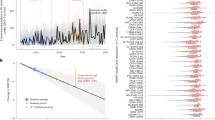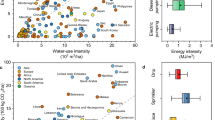Abstract
Climate change impacts can be especially large in cities1,2. Several large cities are taking climate change into account in long-term strategies3,4, for which it is important to have information on the costs and benefits of adaptation5. Studies on climate change impacts in cities mostly focus on a limited set of countries and risks, for example sea-level rise, health and water resources6. Most of these studies are qualitative, except for the costs of sea-level rise in cities7,8. These impact estimates do not take into account that large cities will experience additional warming due to the urban heat island effect9,10, that is, the change of local climate patterns caused by urbanization. Here we provide a quantitative assessment of the economic costs of the joint impacts of local and global climate change for all main cities around the world. Cost–benefit analyses are presented of urban heat island mitigation options, including green and cool roofs and cool pavements. It is shown that local actions can be a climate risk-reduction instrument. Furthermore, limiting the urban heat island through city adaptation plans can significantly amplify the benefits of international mitigation efforts.
This is a preview of subscription content, access via your institution
Access options
Access Nature and 54 other Nature Portfolio journals
Get Nature+, our best-value online-access subscription
$29.99 / 30 days
cancel any time
Subscribe to this journal
Receive 12 print issues and online access
$209.00 per year
only $17.42 per issue
Buy this article
- Purchase on Springer Link
- Instant access to full article PDF
Prices may be subject to local taxes which are calculated during checkout


Similar content being viewed by others
References
De Sherbinin, A., Schiller, A. & Pulsipher, A. The vulnerability of global cities to climate hazards. Environ. Urban. 19, 39–64 (2007).
Rosenzweig, C., Solecki, W. D., Hammer, S. A. & Mehrotra, S. Climate Change and Cities: First Assessment Report of the Urban Climate Change Research Network (Cambridge Univ. Press, 2011).
Aerts, J. & Botzen, W. Adaptation: cities’ response to climate risks. Nat. Clim. Change 4, 759–760 (2014).
Rosenzweig, C. & Solecki, W. Hurricane Sandy and adaptation pathways in New York: lessons from a first-responder city. Glob. Environ. Change 28, 395–408 (2014).
Aerts, J. C. J. H. et al. Climate adaptation. Evaluating flood resilience strategies for coastal megacities. Science 344, 473–475 (2014).
Hunt, A. & Watkiss, P. Climate change impacts and adaptation in cities: a review of the literature. Climatic Change 104, 13–49 (2010).
Hallegatte, S., Green, C., Nicholls, R. J. & Corfee-Morlot, J. Future flood losses in major coastal cities. Nat. Clim. Change 3, 802–806 (2013).
Budiyono, Y., Aerts, J., Brinkman, J., Marfai, M. A. & Ward, P. Flood risk assessment for delta mega-cities: a case study of Jakarta. Nat. Hazards 75, 389–413 (2014).
Oke, T. R. City size and the urban heat island. Atmos. Environ. 7, 769–779 (1973).
Mills, G. Urban climatology: history, status and prospects. Urban Clim. 10, 479–489 (2014).
Jordan, A. J. et al. Emergence of polycentric climate governance and its future prospects. Nat. Clim. Change 5, 977–982 (2015).
Akbari, H., Menon, S. & Rosenfeld, A. Global cooling: increasing world-wide urban albedos to offset CO2 . Climatic Change 94, 275–286 (2009).
Stern, N. The Economics of Climate Change: The Stern Review (Cambridge Univ. Press, 2007).
Munich Re Group Megacities: Megarisks: Trends and Challenges for Insurance and Risk Management (Münchener Rückversicherungs-Gesellschaft, 2004).
Dobbs, R. et al. Urban World: Mapping the Economic Power of Cities 1–49 (McKinsey Global Institute, 2011).
Revi, A. et al. in Climate Change 2014: Impacts, Adaptation, and Vulnerability (eds Field, C. B. et al.) 535–612 (IPCC, Cambridge Univ. Press, 2014).
Zhao, L., Lee, X., Smith, R. B. & Oleson, K. Strong contributions of local background climate to urban heat islands. Nature 511, 216–219 (2014).
US EPA Reducing Urban Heat Islands: Compendium of Strategies Heat Isl. Reduct. Act. 1–23 (2008).
Zander, K. K., Botzen, W. J. W., Oppermann, E., Kjellstrom, T. & Garnett, S. T. Heat stress causes substantial labour productivity loss in Australia. Nat. Clim. Change 5, 647–651 (2015).
Weber, S., Sadoff, N., Zell, E. & de Sherbinin, A. Policy-relevant indicators for mapping the vulnerability of urban populations to extreme heat events: a case study of Philadelphia. Appl. Geogr. 63, 231–243 (2015).
Memon, R. A., Leung, D. Y. C. & Chunho, L. A review on the generation, determination and mitigation of urban heat island. J. Environ. Sci. China 20, 120–128 (2008).
Akbari, H. & Konopacki, S. Calculating energy-saving potentials of heat-island reduction strategies. Energy Policy 33, 721–756 (2005).
Rosenfeld, A. H., Akbari, H., Romm, J. J. & Pomerantz, M. Cool communities: strategies for heat island mitigation and smog reduction. Energy Build. 28, 51–62 (1998).
IPCC Climate Change 2013: The Physical Science Basis (eds Stocker, T. F. et al.) (Cambridge Univ. Press, 2013).
van Vuuren, D. P. & Carter, T. R. Climate and socio-economic scenarios for climate change research and assessment: reconciling the new with the old. Climatic Change 122, 415–429 (2014).
Oke, T. R. The energetic basis of the urban heat island. Q. J. R. Meteorol. Soc. 108, 1–24 (1982).
Oke, T. Urban Climatology and its Applications with Special Regard to Tropical Areas: Proceedings of the Technical Conference Organized by the World Meteorological Organization and Co-sponsored by the World (WMO Secretariat, 1986).
Karl, T. R., Diaz, H. F. & Kukla, G. Urbanization: its detection and effect in the United States climate record. J. Clim. 1, 1099–1123 (1988).
Jones, P. D. et al. The effect of urban warming on the northern hemisphere temperature average. J. Clim. 2, 285–290 (1989).
United Nations, Department of Economic and Social Affairs Population Division: World Urbanization Prospects, the 2009 Revision: Highlights (2010).
KC, S. & Lutz, W. The human core of the shared socioeconomic pathways: population scenarios by age, sex and level of education for all countries to 2100. Glob. Environ. Change 42, 181–192 (2017).
Nordhaus, W. D. & Boyer, J. Warming the World: Economic Models of Global Warming (MIT Press, 2003).
van den Bergh, J. C. J. M. & Botzen, W. J. W. A lower bound to the social cost of CO2 emissions. Nat. Clim. Change 4, 253–258 (2014).
Arrow, K. et al. Determining benefits and costs for future generations. Science 341, 349–350 (2013).
Hall, D. C. Albedo and vegetation demand-side management options for warm climates. Ecol. Econ. 24, 31–45 (1998).
Acknowledgements
W.J.W.B. acknowledges funding from the EU project NATURVATION. The authors acknowledge the technical assistance of B. Martínez-López in processing the MAGICC/SCENGEN output.
Author information
Authors and Affiliations
Contributions
F.E., W.J.W.B. and R.S.J.T. designed the study, analysed the data and wrote the paper. These authors contributed equally to the study. All authors discussed the results and commented on the manuscript.
Corresponding author
Ethics declarations
Competing interests
The authors declare no competing financial interests.
Supplementary information
Supplementary Information
Supplementary Information (PDF 760 kb)
Rights and permissions
About this article
Cite this article
Estrada, F., Botzen, W. & Tol, R. A global economic assessment of city policies to reduce climate change impacts. Nature Clim Change 7, 403–406 (2017). https://doi.org/10.1038/nclimate3301
Received:
Accepted:
Published:
Issue Date:
DOI: https://doi.org/10.1038/nclimate3301
This article is cited by
-
Building energy savings by green roofs and cool roofs in current and future climates
npj Urban Sustainability (2024)
-
Digitizing cities for urban weather: representing realistic cities for weather and climate simulations using computer graphics and artificial intelligence
Computational Urban Science (2024)
-
Anthropogenic influence on extremes and risk hotspots
Scientific Reports (2023)
-
Economic valuation of temperature-related mortality attributed to urban heat islands in European cities
Nature Communications (2023)
-
Surface warming in global cities is substantially more rapid than in rural background areas
Communications Earth & Environment (2022)



